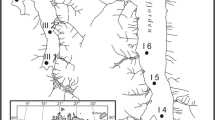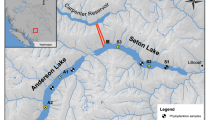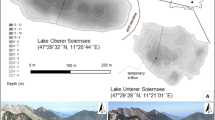Abstract
Sedimentary diatom assemblages in two large oligotrophic clear-water lakes were analysed, to assess their present ecological state and possible eutrophication due to diffuse nutrient loading. The lakes Pyhäjärvi and Puruvesi (Finnish lake district) are proportionally large for their catchment areas which accounts for their long retention times (ca 7 and 11 yr) and oligohumic character. Pyhäjärvi was studied by pairwise comparison of surface sediment diatom assemblages collected in 1985 and 1990 at 12 sites from different parts of the lake. In Puruvesi, the stratigraphy of diatoms was analysed in two short cores from 8 m and 32 m depths.
The diatom assemblages of the two lakes are rather similar, and quite distinct from the assemblages of the mesohumic large lakes of the area. Cyclotella kuetzingiana is the most common planktonic dia- tom, but Aulacoseira ambigua abounds in Pyhäjärvi at sites with local sources of eutrophication. A diverse assemblage of benthic forms, especially Fragilaria and Achnanthes spp. characterizes the shallow bottoms in both lakes.
There was little change within the short-core diatom profiles of Puruvesi, but the floral composition of the 8-m and 32-m sites differed markedly. The 8-m site, with 60–70% of benthic forms, represents illuminated bottom, on which much of the buried algae have lived in situ, while the deeper site is true profundal, dominated by sedimented planktonic algae.
In Pyhäjärvi there was a slight increase in the benthic diatoms from 1985 to 1990, coinciding with increased phosphorus and chlorophyll concentrations as well as Secchi depth lowering. We interprete this observation as a very early step of eutrophication, of which first the sessile algal communities of the illuminated bottom areas have benefited.
Similar content being viewed by others
References
Ahtiainen, M., 1988. Effects of forest clear-cutting and drainage on water quality in the Nurmes-study. In L. Rantajärvi (ed.), Proceedings of the international symposium on the hydrology of wetlands in temperate and cold regions, Joensuu, Finland, 6–8 June 1988. Publications of the Academy of Finland 4/1988: 206–219.
Ahtiainen, M., 1992. The effects of forest clear-cutting and scarification on the water quality of small brooks. Hydrobiologia 243/244: 465–473.
Battarbee, R.W., 1978. Relative composition, concentration, and calculated influx of diatoms from a sediment core from Lough Erne, Northern Ireland. Pol. Arch. Hydrobiol. 25: 9–16.
Battarbee, R. W., 1986. The eutrophication of Lough Erne inferred from changes in the diatom assemblages of 210Pb-and 137Cs-dated sediment cores. Proc. roy. Irish Acad. B 86(B6): 141–168.
Cleve-Euler, A., 1951–1955. Die Diatomeen von Schweden und Finnland. Kungl. Svenska Vetensk. Akad. Handl. Ser. 4. 2(1): 3–163; 3(3): 3–153; 4(1): 3–158; 4(5): 3–255; 5(4): 3–323.
Edsall, T.A., E.F. Stoermer & J.P. Kociolek, 1991. Periphyton accumulation at remote reefs and shoals in Lake Superior. J. Great Lakes Res. 17: 412–418.
Engstrom, D.R., E.B. Swain & J.C. Kingston, 1985. A palaeolimnological record of human disturbance from Harvey's Lake, Vermont: geochemistry, pigments and diatoms. Freshwat. Biol. 15: 261–288.
Flower, R. & H. Simola, 1990. Diatoms in a short sediment core from Lake Höytiäinen, Finland: ecological implications of lake level lowering in 1859 AD. In H. Simola (ed.), Proceedings of 10th Diatom Symposium 1988. Koeltz, Königstein: 433–441.
Haworth, E.Y., 1988. Distribution of diatom taxa of the old genus Melosira (now mainly Aulacoseira) in Cumbrian waters. In F.E. Round (ed.), Algae and the Aquatic Environment. Biopress ltd, Bristol: 138–168.
Hustedt, F., 1930. Bacillariophyta (Diatomeee). In A. Pascher (ed.), Die Süsswassrflora Mitteleuropas 10: 1–466.
Huttunen, P. & J. Meriläinen, 1983. Interpretation of lake quality from contemporary diatom assemblages. Hydrobiologia 103: 91–97.
Kairesalo, T., 1977. On the production ecology of epipelic algae and littoral plankton communities in Lake Pääjärvi, southern Finland. Ann. Bot. Fenn. 14: 82–88.
Kairesalo, T., 1980. Comparison of in situ photosynthetic activity of epiphytic, epipelic and planktonic algal communities in an oligotrophic lake, southern Finland. J. Phycol. 16: 57–62.
Kauppi, M., I. Kettunen, J. Kivinen, R. Niinioja & O. Sandman, 1985. Saimaantila ja siihen vaikuttavat tekijät. National Board of Waters, Helsinki, Report 254, 147.
Kingston, J., R. Lowe, E. Stoermer & T. Ladewski, 1983: Spatial and temporal distribution of benthic diatoms in northern Lake Michigan. Ecology 64: 1566–1580.
Krammer, K. & H. Lange-Bertalot, 1986–1991. Bacillariophyceae. G. Fischer. Stuttgart, 4 volumes Süsswasserflovon Mitteleuropa 2(1–4).
Meriläinen, J. J., 1992. Niukkaravinteinen, kirkas Puruvesi tuottaa mesotrofisen järven profundaalifaunan. In M. Viljanen & S. Ollikainen (eds), Saimaa symposium 1992, research on Lake Saimaa. University of Joensuu, Publications of Karelian Institute 103: 109–116.
Meriläinen, J., H. Kokko & A. Järvinen, 1987. Periphyton of Lake Pyhäjärvi (Karelia). Finnish Fisheries Res. 8: 20–26.
Ministry of the Environment, 1989. Water Protection Programme to 1995. Decision-in-Principle by the Finnish Council of State. Environmental Protection Department, Helsinki, Series B 14/1989, 20 pp.
Minstry of the Environment, 1992. Erityissuojelua vaativat vedet. Environmental Protection Department, Helsinki, Working group Report 63/1992, 176 pp.
Mölder, K. & R. Tynni, 1967–73. Über Finnlands rezente and subfossile Diatomeen, I–VII. Bull. Geol. Soc. Finnland 39: 199–217 (1967); 40: 151–170 (1968); 41: 235–251 (1969); 42: 129–144 (1970); 43: 203–220 (1971); 44: 141–149 (1972); 45: 159–179 (1973).
National Board of Waters, 1981. Vesiviranomaisen käyttämät analyysimenetelmät. National Board of Waters, Helsinki, Report 212, 136 pp.
National Board of Waters, 1984. Vesiviranomaisen käyttämät näytteenottomenetelmät 2nd edn. Publications of the National Board of Waters 40, 56 pp.
Niinioja, R. & M. Ahtiainen, 1987. Water quality of Lake Pyhäjärvi in the 1980s. Finnish Fisheries Res. 8: 13–19.
Niinioja, R., M. Kauppi, I. Kettunen, J. Kivinen, P. Mononen & I. Taipalinen, 1992. Water quality classification of Lake Saimaa in the middle of the 1980s. In Filatov, N. & P. Heinonen (eds), Results of the Finnish-Russian joint study of the lakes Onega, Ladoga, and Saimaa conducted in the summer of 1990. Publications of the Water and Environment Administration, series A. (in press).
Nordisk Ministerråd, 1990. Nordiske vassdarg — vern og inngrep. Miljörapport 1990: 11, 144 pp.
Ollikainen, M., 1992. Karjalan Pyhäjärven tila 1980 — luvulla sedimentin piilevien ilmentämänä. Publications of the Water and Environment Administration, Series A 87,58 pp.
Phillips, G.L., D.F. Eminson & B. Moss, 1978. A mechanism to account for macrophyte decline in progressively eutrophicated freshwaters. Aquat. Bot. 4: 103–126.
Rekolainen, S., 1989. Phosphorus and nitrogen load from forestry and agricultural areas in Finland. Aqua fennica 19: 95–107.
Sarvala, J., K. Aulio, H. Mölsä, M. Rajasilta, J. Salo & I. Vuorinen, 1984. Factors behind the exceptionally high fish yield in the Lake Pyhäjärvi, southwestern Finland — hypotheses on the biological regulation on fish production. Aqua fennica 14: 49–57.
Sebetich, M.J. & R. Messaros, 1992. Paleolimnology of Green Pond, a 200-ha glacial lake in the Highlands Province of New Jersey, U.S.A. XXV SIL Congress. Barcelona, Spain, August, 21–27 1992. Abstracts: 567.
Seuna, P., 1971. Suomen vesistöalueet. Report of the National Board of Waters, Helsinki, 10, 53 pp.
Simola, H. & J. Ronkko, 1988. Diatom assemblages and recent stratigraphic changes in some large lakes in East Finland. In F.E. Round (ed.), Proceedings of 9th International Diatom Symposium 1986. Koeltz, Koenigstein, & Biopress, Bristol: 245–250.
Simola, H., M. Ollikainen, & O. Sandman, 1992. Short-core palaeolimnology of three contrasting basins of Saimaa lake complex in East Finland. Manuscript submitted to Verh. int. Verein. Limnol. 25.
Stevenson, R.J., R. Singer, D.A. Roberts & C. W. Boylen, 1985. Patterns of epipelic algal abundance with depth, trophic status, and acidity in poorly buffered New Hampshire Lakes. Can. J. Fish. aquat. Sci. 42: 1501–1512.
Tynni, R., 1975–1980. Über Finnlands rezente and subfossile Diatomeen, VIII–XI. Bull. Geol. Surv. Finland 274: 1–55 (1975); 284: 1–37 (1976); 296: 1–55 (1978); 312: 1–93 (1980).
Van Vierssen, W., M.J.M. Hootsmans & J.E. Vermaat, 1985: Waterplanten: bondgenoten bij bet waterkwaliteitsbeheer? Een visie op de toekomst van het beheer van waterplantenvegetaties. H2O 18: 122–126.
Author information
Authors and Affiliations
Rights and permissions
About this article
Cite this article
Ollikainen, M., Simola, H. & Niinioja, R. Changes in diatom assemblages in the profundal sediments of two large oligohumic lakes in eastern Finland. Hydrobiologia 269, 405–413 (1993). https://doi.org/10.1007/BF00028038
Issue Date:
DOI: https://doi.org/10.1007/BF00028038




